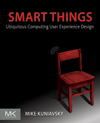William sends a link to a short story about smart furniture and ubicomp.
Blebs had been around for about twenty years now, almost as long as I had been alive. Their roots could be traced back to several decisions made by manufacturers—decisions which, separately, were completely intelligent, foresighted, and well conceived, but which, synergistically, had caused unintended consequences—and to one insidious hack.The first decision had been to implant silicon RFID chips into every appliance and product and consumable sold. These first chips, small as a flake of pepper, were simple transceivers that merely aided inventory tracking and retail sales by announcing to any suitable device the product's specs and location. But when new generations of chips using adaptive circuitry had gotten cheaper and more plentiful, industry had decided to install them in place of the simpler tags.
At that point millions of common, everyday objects—your toothbrush, your coffee maker, your shoes, the box of cereal on your shelf—began to exhibit massive processing power and interobject communication. Your wristwatch could monitor your sweat and tell your refrigerator to brew up some electrolyte-replenishing drink. Your bedsheets could inform the clothes-washer of the right settings to get them the cleanest. (The circuitry of the newest chips was built out of undamageable and pliable buckytubes.) So far, so good. Life was made easier for everyone.
Then came the Volition Bug.
The story also has many animist elements to it. I've written about animist reactions to ubicomp before, but it's nice to see it as part of a story, since that brings the point home even better. There's also a nod to the Power Tool Drag Races.



